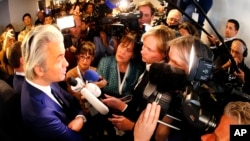Dutch Prime Minister Mark Rutte and his right-liberal People's Party for Freedom and Democracy ran a full page newspaper advertisement Monday calling for people to "act normal or leave" the Netherlands if they do not like the country and its values. The message is seen by critics as targeted at Dutch citizens of a non-Western background.
Political parties in the Netherlands have kicked off their campaigns for March 15 parliamentary elections.
Despite the Dutch reputation of being an open and tolerant country, populist Geert Wilders and his Freedom Party are leading the polls. His message is anti-establishment, anti-immigrant, anti-EU and anti-Islam.
The prime minister's party is in second place.
André Krouwel is a political analyst and director of Kieskompas (Electoral Compass), an online website advising voters. He says Dutch anti-immigrant populism started in the 1990s, after the collapse of the Berlin Wall:
“You see that people became less secure about voting for the traditional parties in the Netherlands. They started to look to alternatives, and also populist alternatives, because of their increased insecurity in the economic, but also the cultural sphere.”
Several populist and anti-immigrant parties were established and some made it into parliament, but Wilders' is the only one still standing.
Kay van de Linde is a political spin doctor who worked with some of those anti-establishment parties in the 2000s. He says most parties fail because they blow themselves up:
“The most difficult thing was to organize a political party and get good people. And that’s always the problem. Even Wilders is not immune to that. The thing he fears the most is dissent within his own ranks. That’s why he organizes very secretive[ly]. He is basically in charge of everything. He fears infighting.”
Wilders’ Freedom Party is not really a party, as he is the only official member. It is said he is the only one calling the shots, with the others following his lead.
Dutch governments are always coalitions of several political parties. Almost all political leaders, including the prime minister, have said they will never govern with Wilders because of his hardline views.
The Freedom Party backed a Cabinet coalition once, between 2010 and 2012. But a split between Wilders and the other two parties led to the fall of the Cabinet, and the government did not have enough parliamentary seats without Wilders’ support.
Krouwel says that Wilders has achieved very little, even during those two years when he was supporting the government:
“Populists have a very bad record of turning their ideas into policies. The only impact they really have is that they push mainstream parties towards their goal.”
A number of new political parties, mostly anti-EU and anti-establishment, are also on the ballot for the March elections. Jan Roos, a TV presenter turned politician, is the leader of VNL, a new right-wing party. He was the driving force behind the national referendum on a deal between Ukraine and the European Union, a deal that was rejected by more than 60 percent of Dutch voters.
Roos says the Dutch have never been particularly pro-EU, two referendums on European issues, one in 2005 and another in 2016, were both rejected by citizens.
“Those were the only two times we had a real popularity poll on the policies of the European Union. Both times a large majority rejected it. So the Netherlands has never been pro-European Union. T he pro-EU story is just simply not true.”
While Dutch politics clearly shifted to right in 2010, populist rhetoric is now causing polarization on both sides of the political spectrum.
As a fight for the support right-wing voters continues, the battle for left-wing Dutch voters has yet to be settled and has become more competitive in recent weeks.





